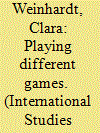| Srl | Item |
| 1 |
ID:
189234


|
|
|
|
|
| Summary/Abstract |
The global power shift towards Brazil, India, China and other non-western powers has led to pressures to adjust international institutions to new economic realities. Most power shift theories assume that established powers defend their institutional privileges, while emerging powers challenge them. Conversely, in this article we reverse this assumption by shedding light on ‘privileges’ of the weak: many international institutions have established special rights for disadvantaged regime members. We ask what strategies emerging powers adopt as they come under pressure to give up these rights commonly reserved for regime members with developing country status. We present a novel conceptualization of four ideal-typical strategies that combine elements of resistance and accommodation. Empirically, we examine the strategies that Brazil, India and China (BICs) have adopted in the World Trade Organization. We find that no uniform approach exists across the BICs: while India fiercely resists giving up its status as a developing country and the flexibilities it comes with, Brazil adopts a pragmatic approach that largely accommodates established powers' demands to give up special rights reserved for developing countries. China pursues a mixed strategy of selective accommodation and resistance. These findings contribute to recent debates on global power shifts by illustrating how material incentives and status considerations shape the adaptation of international institutions as privileges for the weak are re-negotiated.
|
|
|
|
|
|
|
|
|
|
|
|
|
|
|
|
| 2 |
ID:
155489


|
|
|
|
|
| Summary/Abstract |
The outcomes of international negotiations cannot be understood without considering how participants behave strategically. But how do “rules of the game” in negotiations—and the uncertainty that often surrounds them—shape this behavior? I examine the 2002–2007 period of the negotiations of Economic Partnership Agreements (EPAs) between the European Union and West Africa. I argue that both sides made misguided strategic choices. Their misperceptions of the rules operative in trade negotiations with a “development dimension” facilitated the emergence of an impasse during the 2002–2007 negotiating period of the EPA process. In order to explain why, we should conceive of bargaining processes as spaces defined by unstable and potentially contested rules. I offer three mechanisms —payoff disjuncture, choice-range disjuncture, and style disjuncture—that help account for how misperceptions of these socially constructed rules can prevent, or at least delay, cooperation. My approach complements rationalist theories that rely on the insights of game theory with a constructivist perspective that brings to light the socially constructed nature of negotiation processes.
|
|
|
|
|
|
|
|
|
|
|
|
|
|
|
|